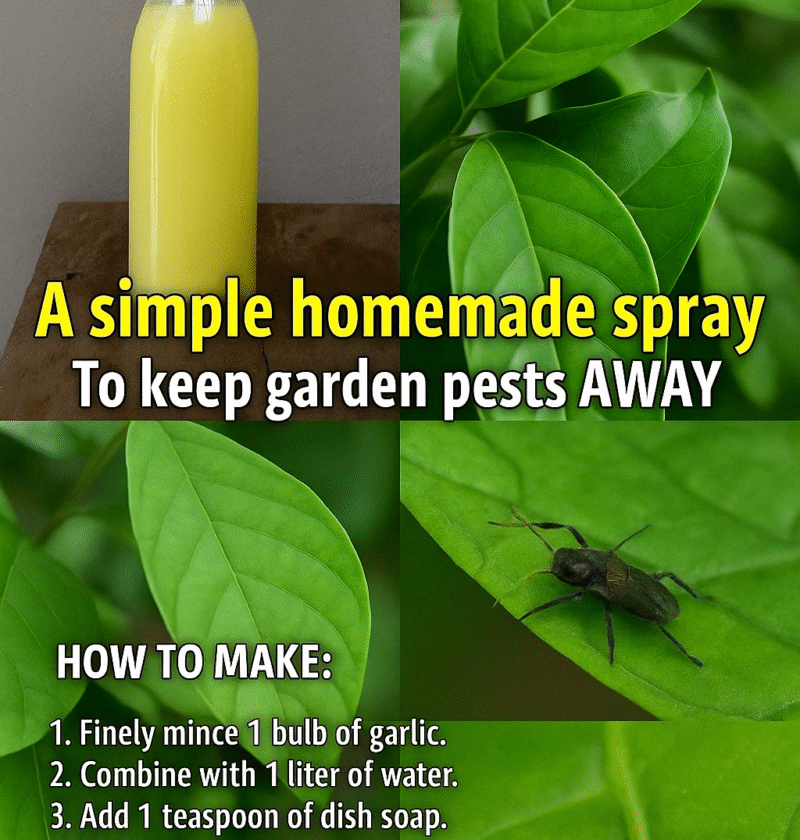DIY Natural Garden Sprays to Repel Pests – Keep Your Garden Safe, Naturally 🌱
Every gardener knows the frustration of pests invading their carefully tended plants. From aphids sucking the life out of your tomatoes to whiteflies infesting your herbs, garden pests can turn a healthy green oasis into a struggling mess overnight. But here’s the good news: you don’t need harsh chemicals or synthetic pesticides to protect your garden. With a few natural ingredients you likely already have at home, you can create eco-friendly garden sprays that are not only effective but safe for your plants, pollinators, and pets.
In this guide, you’ll learn how to make three powerful natural sprays—a garlic defense mist, a citrus zest repellent, and an oil-based bug blocker. Each is tailored to target common garden pests while nourishing your plants and protecting beneficial insects like bees and butterflies.
Why Choose Natural Sprays Over Chemicals?
Safe for Pollinators: Harsh pesticides can harm bees, butterflies, and ladybugs.
Better for the Environment: DIY sprays reduce chemical runoff and soil damage.
Gentle on Plants: Homemade solutions prevent phytotoxicity or leaf burn common with synthetic sprays.
Cost-Effective: Most ingredients are already in your kitchen.
Customizable: You control the concentration and ingredients.
Whether you’re growing tomatoes, roses, or herbs, natural sprays are a smart, sustainable choice for healthy, thriving plants.
1. Garlic Defense Mist – Nature’s Powerhouse Against Pests
Garlic is more than just a kitchen staple—it’s a natural pest deterrent thanks to its strong scent and sulfur compounds, which many insects find repellent. This garlic spray targets soft-bodied pests like aphids, whiteflies, spider mites, and even some beetles.
Ingredients
5 garlic cloves, peeled and crushed
500 ml water (for steeping)
1 liter water (for dilution)
2 teaspoons mild dish soap (unscented, biodegradable preferred)
How to Make It
Step 1: Crush the garlic cloves and place them in a jar or container. Pour in 500 ml of water and let it steep for 12–24 hours.
Step 2: After steeping, strain the garlic water through a fine mesh sieve or cheesecloth to remove solids.
Step 3: Add the dish soap to the garlic concentrate. The soap helps the spray stick to plant leaves and enhances the solution’s effectiveness.
Step 4: Dilute the mixture with 1 liter of clean water. Pour into a clean spray bottle.
Step 5: Spray directly onto the leaves and stems of affected plants. Be sure to spray the underside of leaves where pests often hide.
Application Tips
Apply early in the morning or late in the evening to avoid leaf burn from the sun.
Reapply every 4–5 days or after heavy rain.
Avoid spraying on very young seedlings or stressed plants without spot testing first.
What It Repels
Aphids
Whiteflies
Cabbage loopers
Leaf miners
Ants
Spider mites
Pro Tip
Add a small piece of hot chili or a pinch of cayenne pepper to the garlic mixture during steeping for extra pest-fighting power.
2. Citrus Zest Repellent – Fresh and Effective
This citrus-based spray uses the natural oils found in lemon and orange peels to repel small flying insects like whiteflies, aphids, fungus gnats, and even mosquitoes around the garden. It also smells amazing, making it perfect for ornamental flower beds and herb gardens.
Ingredients
Peel from 1 lemon or orange
500 ml boiling water
Spray bottle
Optional: 1 tsp apple cider vinegar for added pest-repelling power
How to Make It
Step 1: Grate or chop the citrus peel and place it in a bowl or jar.
Step 2: Pour 500 ml of boiling water over the peels. Let it sit uncovered until cooled, then cover and steep overnight (about 24 hours).
Step 3: Strain the mixture to remove any solids. Pour the liquid into a spray bottle.
Step 4: (Optional) Add 1 tsp of apple cider vinegar and mix well.
Step 5: Spray directly on plant foliage, especially where insects are visible or damage is occurring.
Application Tips
Use on herbs, flowers, and fruiting plants.
Avoid applying in direct sun or during extreme heat.
Great for potted plants and balcony gardens.
What It Repels
Aphids
Whiteflies
Gnats
Mosquitoes
Ants
Bonus Benefit
Citrus oils may also deter cats and dogs from digging in garden beds.
3. Oil-Based Bug Blocker – Long-Lasting Protection
This DIY oil spray is a powerful option for tougher pests. The oil coats soft-bodied insects like aphids, mites, and thrips, suffocating them on contact. The soap helps the oil and water emulsify and stick to the leaves.
Ingredients
1 cup vegetable oil (sunflower or canola work well)
1/4 cup liquid dish soap (natural, non-antibacterial)
1 liter water
Spray bottle
How to Make the Base
Step 1: Mix the oil and dish soap in a jar. Shake vigorously to blend. This is your concentrated base—store it in a cool, dark place.
How to Use It
Step 2: For each application, mix 1 tablespoon of the oil base into 1 liter of water. Shake well.
Step 3: Pour into a spray bottle and apply to affected plants.
Step 4: Spray both the tops and undersides of leaves, as well as any visible pests.
Application Tips
Test on a small leaf section first to check for sensitivity.
Apply in cooler parts of the day to prevent leaf scorching.
Do not apply more than once every 7 days.
What It Targets
Aphids
Thrips
Spider mites
Mealybugs
Scale insects
Storage
The concentrated oil base can be stored for several weeks in a sealed jar. Always shake before each use.
Safety & Storage Tips
Label your spray bottles to avoid confusion.
Keep out of direct sunlight and away from children.
Reapply natural sprays after rainfall or overhead watering.
Avoid spraying flowers directly—focus on stems and leaves.
Never mix sprays unless you know the ingredients are compatible.
Gardeners’ Favorite Tricks
Companion Planting + Sprays: Combine these sprays with companion planting strategies like marigolds, basil, or nasturtiums to repel even more pests naturally.
Neem Oil Alternative: For severe infestations, neem oil diluted with water and soap offers a more potent—but still organic—solution.
Rotation Strategy: Rotate between garlic, citrus, and oil-based sprays every 1–2 weeks to avoid pest adaptation.
What Garden Experts Say
Kevin Espiritu (Epic Gardening): “DIY sprays are my first line of defense. They’re safe, effective, and let you stay in control.”
Melissa K. Norris: “Natural pest sprays like these work beautifully when used regularly. Consistency is key.”
Charles Dowding: “Keep it simple. Garlic and oil sprays can resolve most pest issues without disturbing garden balance.”
Joe Lamp’l: “Sometimes all your garden needs is a homemade boost—and these sprays provide exactly that.”
Jessica Sowards (Roots and Refuge): “I love the citrus spray—it smells great and keeps pests off my tomatoes without hurting the bees.”
10 Frequently Asked Questions (FAQs)
1. Are these sprays safe for edible plants?
Yes, all ingredients used are safe for vegetables, herbs, and fruit-bearing plants. Just avoid spraying right before harvest and rinse before eating.
2. Will these sprays kill bees or butterflies?
No—when applied properly. Avoid spraying blooms or during midday when pollinators are active.
3. Can I use these on indoor plants?
Absolutely. Citrus and oil sprays are great for houseplants with pest issues like spider mites or fungus gnats.
4. How often should I apply these sprays?
Apply every 5–7 days or after heavy rainfall. Adjust based on the severity of infestation.
5. Can I use all three sprays at once?
No, rotate between them weekly. Mixing may result in too much leaf stress or chemical reaction.
6. Do I need to strain the sprays?
Yes, especially garlic and citrus sprays. Residue can clog sprayers.
7. Will rain wash the spray away?
Yes. Reapply after rain for continued effectiveness.
8. Can I use essential oils instead of zest or garlic?
You can, but essential oils are highly concentrated—use caution and always dilute properly.
9. What kind of dish soap should I use?
Choose a mild, natural dish soap that is free of antibacterial agents, bleach, and fragrances.
10. Can I store leftover spray?
Yes, for up to 1 week in the fridge. Bring to room temperature before reusing.
Final Thoughts
Nature provides all the tools you need to protect your garden—no toxic sprays required. Whether you’re battling aphids, mites, or slugs, these DIY natural pest sprays offer effective, eco-conscious solutions that are gentle on your plants and powerful against invaders.
So grab that garlic, zest some citrus, or mix up an oil base—and take back control of your garden the natural way. Your plants, pollinators, and the planet will thank you.
Must express something to keep getting my recipes… Thank you!






